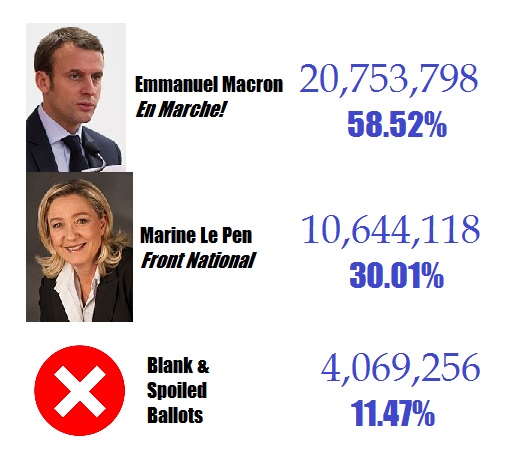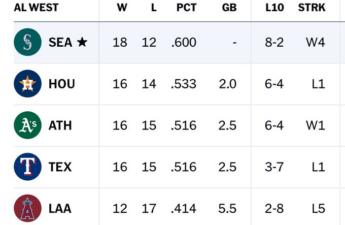
The headlines about France today correctly report that previously unelected businessman Emmanuel Macron crushed legacy politician Marine Le Pen in yesterday’s runoff for the French Presidency. This was expected and unsurprising, though the media wanted to treat it like a surprise after seeming surprises in the Brexit vote and the US Presidential elections in 2016. By mistakenly conflating the US, UK, and France as all the same country and part of the same set of movements, the media tried to build the case for suspense in this election and claim that Marine Le Pen would ride the wave of right-wing populist resistance into contention. Obviously, that didn’t happen.
What also didn’t happen, however, is that Macron won with 66.1% of the vote to Le Pen’s 33.9%, the figures that have been reported in every major outlet. He actually received 58.5% to Le Pen’s 30.0%. Still a crushing victory. But it also accounts for the 11.5% of people who marched to the polls merely to cast a protest vote, submitting either a blank or spoiled ballot.
The significance of these voters is hard to overstate. There was nothing else on the ballot at this referendum. There were no mayors or parliamentary representatives, no local ordinances or dog-catchers. Just the Presidency. And more than 4 million French voters went to the polls only to say non loudly and clearly to both Macron and Le Pen.
A fair amount has been reported about the turnout for the election, the lowest by percentage since 1969. And that data point is also, of course, a form of protest with its own significance. But the problem with abstaining from a vote is that your votes don’t get counted anywhere. You don’t demonstrate the power of your protest by making someone count it up. But 4 million French voters forced someone to count. And it’s important in our assessment of this election and what it means for the future of Europe, democracy, and European democracy, that we don’t pretend those people don’t exist and didn’t vote. They did and we ignore them at our peril.
What’s so significant about those folks, of course, is that they didn’t have a third option of a person to vote for. We are recited the absurd narrative here in the United States that it is only the existence of people like Jill Stein and Gary Johnson, of Ralph Nader, Ross Perot, John Anderson, and so on, that enables people to not fall in line behind one of the two major party candidates. That all of those votes and voters are the rightful property of one of the two major parties (increasingly we are told they are all, to a soul, the rightful property of the Democrats) and would instantly vote D or R were it not for the wayward allure of third parties mucking everything up. And yet, in a situation where there are literally only two people for whom one can legally vote, the third option won 11.5% of the tally. Which dwarfs the 5.7% combined offered to third parties in 2016 America.
Given that over 60% of those who voted for Macron said they were doing so primarily to vote “not Le Pen”, the headline of a resounding mandate for the unpolitical business figure starts to crumble. Certainly a huge number of US voters in 2016 trudged to the polls to cast a “not Clinton” or “not Trump” ballot, culminating in a slight edge for “not Clinton” in the electoral college. We’ve seen exactly how little of a mandate Trump has, both politically and popularly, since his election. And we should expect the same trail of resistance to Macron, even more so for the fact that he entirely lacks a parliamentary party. He will have to try to backfill it in order to govern.
Make no mistake, right-wing nationalism has been turned away in France with yesterday’s vote. But increasingly, the politics of binary choices between right-wing nationalism and uber-capitalist globalism is also getting soundly rejected. And to pretend that binary democracy-as-usual is coasting along just fine when turnout plummets and 11.5% of voters take the time out of their day to register their rejection seems to miss the boat of our current trends.
We are told all the time that enough voters to swing the election stayed home in any given election. But we are also told by the same people that there are only two real choices in any vote. How do people not understand that the latter perception causes the former? Even in a situation where there are actually only two choices, the people are saying no. Only if someone listens to this will more people feel compelled to engage in their democracy, to find that it is responsive enough to be worthy of their engagement. Until then, the gap of disconnection between the wealthy politicians and the disaffected they leave behind will only widen.


